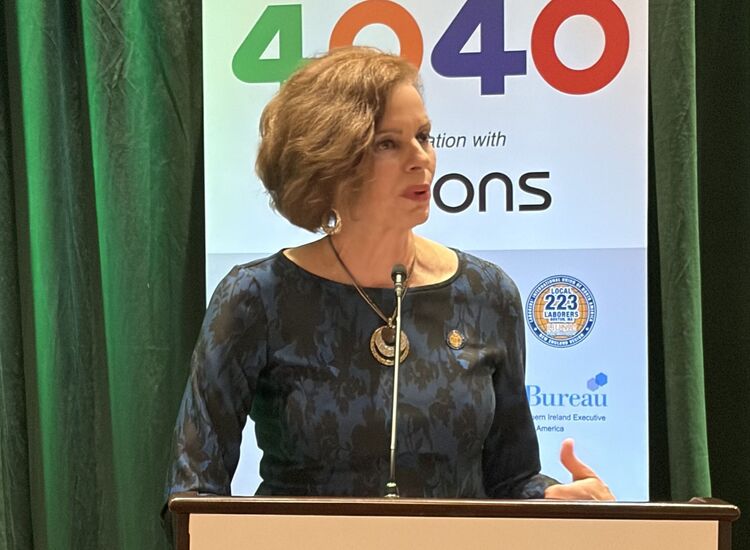Theater / By Orla O’Sullivan
“The Weir” * By Conor McPherson * Starring Dan Butler, Billy Carter, Sean Gormley, John Keating and Tessa Klein * Directed by Ciarán O’Reilly * Set Design, Charlie Corcoran* at The Irish Repertory Theatre, 132 W. 22nd St. NYC * Playing Wed. through Sunday to July 7 * Tickets through 212-727-2737 or www.irishrep.org.
A guy walks into a bar… or a fella, in this case, since Conor McPherson’s play “The Weir” takes place in a country pub in Ireland.
The imaginings start with the regulars anticipating the arrival of a local married businessman with a young one from Dublin, then move on to a series of ghost stories once the pair arrive. The tall tales end, surprisingly, with one that’s very much down to earth.
It might not sound like much, but McPherson’s masterly spinning won him an Olivier award — Britain’s answer to the Tony — in 1998, shortly after it was first produced.
To wonderful writing, the Irish Rep adds great acting and directing (Ciarán O’Reilly), such as when this attractive woman from the big smoke causes consternation by ordering a white wine in the hinterland. The set is also perfect, down to the old-style payphone, once typical in Irish bars.
“The Weir” leaves you entertained and intrigued as to its message. The play takes its name from a weir, or dam, placed on Ireland’s main river, The Shannon, to generate electricity at the point in County Leitrim called Carrick-on-Shannon. In local lore, the hydro-electric plant also crossed—impeded?—a fairy road.
Undercurrents flow through the bar talk, along with suggestion of underlying forces that it’s not always possible to control, whether ghosts or the loneliness of the human condition.
The evening starts with Brendan (Billy Carter), the proprietor, telling a customer he’s resisting pressure from his sisters to sell land. “They’ve no attachment to the place?” Jack (Dan Butler) correctly discerns.
They are joined by Jim, the epitome of decency, wonderfully conveyed by John Keating. Jim is just a laborer, but eager to buy others drink and equally quick with the names of locals living or dead to supplement the evening’s stories.
The hotelier Finbar (Sean Gormley) is a completely recognizable type, down to his beige suit and open-necked lilac shirt.
Jack, a local garage-owner, resents Finbar, a country-fella-turned-townie, but less for his money than at first seems.
They compete to impress the one woman in the place. Finbar mocks the “old lads living on their own… [with] 30 years of old newspapers and cheap thrillers, all lying there in the damp since their mammies died.”
Then the supernatural stories turn so dark Jack and Finbar are afraid they have terrified the newcomer. Their argument over who is at fault ends comically in an argument over who will buy whom a drink.
Valerie surprises the others by expressing relief that she has been given license to tell her personal tale. (Klein’s monologue is less moving than it might be and, neither she nor the otherwise powerful Butler have fully convincing Irish accents.)
Valerie’s shocker is followed by Jack’s simple story of love lost. It’s told once Finbar has returned home, to his wife.
Jack lost his chance of marriage because he could not countenance a move to Dublin. A bus of locals traveled up to see his ex wed. That dark, drunken occasion for Jack gave way to an epiphany about his connection to his community.
McPherson’s tale meanders like a river. Individual stories join like tributaries and end in something of a love story to a way of life.
“There’s no dark like a winter’s night in the country,” Jack remarked towards the start of the play. By the end, there’s a feeling that there may be no connection like that found in an Irish, country pub.
Time flies, 100 minutes are up. You just dropped in “for one” and suddenly it’s closing time.









